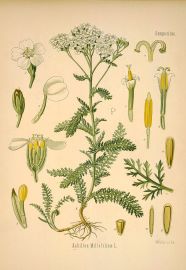Staunch Yarrow:
The Military Herb
By Audrey Stallsmith

(The nermit gathers)
The yarrow, wherewithall he stops the wound-made gore.
Drayton
War is almost as old as history, and yarrow is almost as old as war. For centuries, prudent soldiers carried the herb to staunch battle wounds. Officially known as Achillea millefolium, it was named for Achilles. One of the military heroes in Homer's Iliad, Achilles learned the plant's secrets from a centaur named Chiron.
Millefolium, on the other hand, means "thousand-leaf," a reference to the ferny foliage. Mattioli describes those leaves as being "like the wispy feathers of young birds." The flowers, writes Mrs. Grieve, are "white or pale lilac, being like minute daisies, in flattened. . .heads."
As a result of its popularity with fighting men, the herb was also calledherba militaris, knight's milfoil, bloodwort, and staunchgrass--and stands for "war" in the Language of Flowers. The common name, yarrow, derives either from the Anglo-Saxon gearwe or the Dutch yerw.
Although most famous for its ability to stop bleeding--it speeds clotting--yarrow was occasionally twirled inside the nostrils to start bleeding as well. A nosebleed was once considered a good cure for headache, or a promise of success in love. A hopeful old chant runs "Yarroway, yarroway, bear a white blow (flower),/ If my love love me, my nose will bleed now."
In an old Scottish raum (rhyme?), a poet conjures up his beloved's image with yarrow:
I rose early in the morning yesterday
I plucked yarrow for the horoscope of thy tale
In the hope that I might see the desire of my heart
Ochone there was seen her back towards me.
The herb's supposed "insight" made it popular with soothsayers and witches as well as lovers, so that it was also known as devil's nettle. In ancient China, 50 dried and stripped yarrow stalks were used as an oracle: "the medium by which deities were consulted" (Webster). A person holding the herb over his/her eyes was supposed to be able to see into the Other World.
Witches believed that sprigs of yarrow, known as Cappeen d' Yarray, in their caps would allow them to fly. And an old incantation ran, "There's a crying at my window and a hand upon my door,/ And a stir among the yarrow that's fading on the floor. . ." On the principle, perhaps, that it takes fire to fight fire, the common people believed that yarrow would also protect them from evil.
Although its powers are not supernatural, the herb does have an amazing ability to cleanse and heal wounds. In earlier times, it was often "stamped with swine's grease" to make ointment.
John Heinerman tells a more modern story of a teen on a hiking trip who accidentally stabbed himself in the leg with a piece of sharp firewood. Since the camping party did not have adequate first-aid equipment with them, they crushed yarrow and taped it over the wound. When the boy saw a doctor a couple days later, the medic could find no trace of the original gash.
Yarrow also aids other herbs growing close to it, increasing their health and essential oils, and attracting beneficial insects. Ironically enough, the only plant it doesn't help is itself. Over several years, a build-up of its own toxins in the soil will hinder the herb's growth. Pregnant women should avoid yarrow, since large doses may cause abortion.
Besides wounds and sores, yarrow has been used to treat a multitude of other problems, including eruptive diseases like measles or poxes. Jethro Kloss wrote that, "if taken freely at the beginning of a cold, with other simple remedies, it will break it up in 24 hours." That is probably attributable to the herb's competence at cooling fevers, increasing circulation, soothing aching muscles, and healing mucous membranes.
John Heinerman touts yarrow's "great ability to reduce tissue and joint inflammation in everything from wounds and edema to gout and arthritis." So it will make a soothing bath for sore muscles or aching joints, and was sometimes chewed to dull toothache pain. It also stops internal hemmorrhages, such as bleeding in the lungs and ulcers, and relieves digestive problems.
Brewers flavored beer with this "field hop," perhaps because it had a reputation for dispelling melancholy! It was also added to snuff, winning it another nickname: "old man's pepper." The flavor, however, is supposed to be more similar to nutmeg and cinnamon, for which it sometimes served as a bitter substitute.
Yarrow reminds me of the strong, silent male who is willing to protect and help everybody else, but never mentions his own problems. Salt of the earth, in other words, but he needs dug out of his rut occasionally--for his own good
Achillea millefolium image is from Kohler's Medizinal-Pflanzen, courtesy of the Missouri Botanical Garden.








